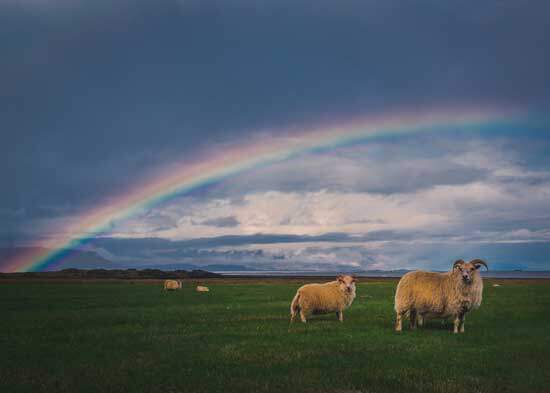Why Is There Good Versus Evil in the World?
Human nature is capable of the most self-sacrificing and heroic acts—a soldier risking his life for his country, a mother protecting her children from harm, a man jumping into a swirling current to save someone who is drowning.
By the same token, people also commit some of the most selfish and revolting acts of cruelty—war crimes, genocide, rape, abuse.
Why does our world have this tension between good and evil?
Our world started as perfect and sinless, but the Bible lets us in on the story of a proud angel who chose to oppose God’s principle of self-sacrificing love and introduce selfishness to our world. He tempted the first humans to doubt God’s goodness and choose the knowledge of evil.
Ever since, the struggle between good and evil has continued.
On this page, we’ll explore what the Bible has to say about this problem of evil and the solution to it.
We’ll look at:
- What is good, and what is evil?
- What is the biblical understanding of good and evil?
- How did evil start?
- What are the results of evil?
- What is the solution to evil in this world?
Let’s get started.
What is good, and what is evil?
Good refers to being morally right or virtuous. A person who helps the needy and promotes a community’s well-being is considered good.
On the other hand, evil means immorality or wickedness—something that brings about misfortune or suffering. For example, many would say Hitler was an evil man for his cruelty.
The difference between good and evil—and how the two forces work—is a subject that has baffled many.
Theologians, philosophers, and even scientists have attempted to explain this dualism—the existence of both goodness and evil in the world and in us.
Here are some of their viewpoints:
- St. Augustine of Hippo described evil as “spoiled goodness” that comes to play when humans choose “a lesser good.”
- Thomas Aquinas saw evil as a lack of goodness and believed it served a greater good.
- In Buddhism, good and evil aren’t mutually exclusive. Instead, they are relative qualities existing in us on a spectrum, and we can cultivate goodness over evil.
- C.S. Lewis, a 20th-century Christian apologist, saw evil as spoiled goodness that’s made possible by man’s free will.1
- Evolutionary biologists believe that both good and evil behaviors have their roots in selfishness. Even actions that might help others and seem selfless are hidden forms of looking out for self.
Adventists have also looked at this topic and drawn their understanding from what the Bible teaches about it.
We’ll look at that next.
What is the biblical understanding of good and evil?
The Bible acknowledges the existence of both good and evil. Goodness is rooted in who God is—selfless love. Evil, on the other hand, is separate from Him and His character. It came from the choice of a being to turn away from God’s goodness.
Here’s more on the origins of good and evil.
God is the source of all goodness
The Bible tells us that everything started as “very good” (Genesis 1:31, NKJV)—that God created everything perfect.
God Himself is good. So everything He does or creates is also good.
The Bible also says, “God is love” (1 John 4:8, ESV).
So, God is perfect and loving. He is just, merciful, and kind. He operates on the principle of pure selflessness and devotion.
God knew we would struggle to understand what it means to be good, so He reveals His goodness through the Bible.
The Ten Commandments, given to us by God, are an important source for this. Rather than being a list of dos and don’ts, they describe His character and what it means to be good—to love God and people.
 But it’s not just the Ten Commandments that reveal goodness. Throughout the Bible, God shows us how to love as He loves. And when we fall short, as we all do, He lets us know He will continue to love and guide us.
But it’s not just the Ten Commandments that reveal goodness. Throughout the Bible, God shows us how to love as He loves. And when we fall short, as we all do, He lets us know He will continue to love and guide us.
We find more examples of goodness in the Bible, like traits worth seeking and developing and the optimal ways to live our lives.
With the help of the Holy Spirit, we can have the fruit of the Spirit: “Love, joy, peace, patience, kindness, goodness, faithfulness, gentleness, self-control” (Galatians 5:22–23, ESV).
But knowing what is good and being good are totally different, as Paul points out:
“For I have the desire to do what is right, but not the ability to carry it out. For I do not do the good I want, but the evil I do not want is what I keep on doing” (Romans 7:18–19, ESV).
So, what is the evil that creeps in to keep us from doing good?
Evil is the opposing force to God
 Evil is the absence of good and is rooted in selfishness. It’s the result of choosing to live separately from God, the source of all goodness.
Evil is the absence of good and is rooted in selfishness. It’s the result of choosing to live separately from God, the source of all goodness.
As Creator, God made human beings with the ability to love.
But He did not pre-program us. Instead, God gave us the intelligence and mental capacity to choose who to love, and He works hard to preserve our freedom of choice. That is what makes our love real—being able to choose to love.
When we have the ability to choose, God understands we could choose another option, one that isn’t Him and isn’t good. We could choose to live a life of service, modeled after His love, or we could choose a life for ourselves—one that is self-focused and ultimately unfulfilling and destructive.
But before we choose, we need to understand the whole story.
Why does evil exist? And where did evil even come from?
Not from God, as we will see (James 1:13–15).
How did evil start?
Evil was born when an angel called Lucifer became jealous of God. Though Lucifer seemingly had it all as a beautiful and powerful angel in heaven, he wanted more (Ezekiel 28:13–15).
He didn’t want to worship God.
He wanted to be God (Isaiah 14:12-14).
So in the perfection of heaven, the opposing side of evil came to be. Lucifer chose a self-centered life and turned his back on God and his perfect life in heaven.
He stirred up trouble among the angels by planting doubt in their minds and leading them to question God’s authority and love.
By this, he began a rebellion against God and all who were loyal to Him.
Eventually, Lucifer and one-third of the angels he’d persuaded were expelled from heaven and cast down to Earth (Revelation 12:4, 7–8).
It was then that Lucifer became known as Satan, the Devil, and “ruler” of the earth. He began his work to deceive and cause people on earth to doubt God, too (Revelation 12:9).
And his deceptive work continues today.
Satan’s constant interference with God’s perfect creation creates the struggle we experience daily.
The struggle is known to Adventists as the Great Controversy—the war that began in heaven and has continued in our world through the ages.
What are the results of evil?
When evil entered our world, it separated us from God and created a rift between the first humans. Pain, suffering, and difficulty became part of the normal fabric of life.
But how did evil make its way to the human family?
When Satan was sent to the earth, he became obsessed with opposing God in every way possible. He set out to corrupt God’s creation.
He entered the perfect Garden of Eden where Adam and Eve—the first humans—lived.
God had created the Garden to be Adam and Eve’s forever home, providing them with everything they would need to survive—pure water, plants to eat, animals to care for, and, most importantly, God’s presence.
All this came with structure. You could even say “rules.”
But these rules weren’t put in place to restrict. God put them in place to protect Adam and Eve from making choices that would hurt them.
They had access to the whole Garden, except “the tree of the knowledge of good and evil” (Genesis 2:17, ESV). God instructed them not to eat from it because if they did, they would die.
But Satan came in and lied to Eve, saying:
“You will not surely die. For God knows that when you eat of it your eyes will be opened, and you will be like God, knowing good and evil” (Genesis 3:4–5, ESV).
The lie was that she would not die.
But he masked it with the truth—that she would know good and evil. And that truth was coupled with the statement that she would “be like God,” an appealing prospect.
Believing the lie, Eve and her husband Adam ate the forbidden fruit (Genesis 3:6). That is when they understood evil, which they didn’t know before. Their eyes were opened—but not to anything they would want to see or experience.
Up until then, all they’d known was good. But through Satan’s temptation, Adam and Eve came to know the flip side—evil:
“Then the Lord God said, ‘Behold, the man has become like one of us in knowing good and evil’” (Genesis 3:22, NKJV).
Though Adam and Eve didn’t die right then, they opened the door for death to enter the world. Unlike God’s original plan for humanity, they and their future generations would live, and then die.
Evil also brought with it the following painful consequences:
- Separation from God and a shame that makes humans want to hide from God (Genesis 3:7–11)
- Losing the right to the Garden of Eden and the Tree of Life (Genesis 3:23–24)
- Pain in childbirth (Genesis 3:16)
- Wear and tear from work (Genesis 3:17–19)
- Strained relationships and additional obstacles to having a happy relationship (Genesis 3:16)
- The inclination to sin (Romans 7:15–20)
- Death (Genesis 3:19)
Those consequences—and more—are the ones we continue to struggle with.
Thankfully, God has a plan so we won’t have to struggle with them forever.
What is the solution to evil in this world?
Since evil leads to death, and we could never save ourselves from our inclination toward it (the inclination to go against God’s law of love), God came up with a plan to save us—He sent us Jesus. Jesus Christ, the Son of God, died in our place and took our sinful fate upon Himself.
See, God knows that whenever we make a choice against Him and experience the consequences, we become blind to His love and hardened in our rebellion against Him. We are not capable of complete love or goodness without His help (Romans 3:22–24).
So He found a way to showcase His love for us and bring us back to Him. A plan to save us from ourselves—if we choose Him.
To accomplish that, He sent Jesus.
The Bible tells us, “God so loved the world, that He gave His only Son, that whoever believes in Him should not perish but have eternal life” (John 3:16, ESV).
Jesus came to the earth to live as a human. He gave up everything that made Him divine and prayerfully stayed connected with His Father God.
He was born as a human, lived a life of difficulty and poverty, and died in our place, taking on the consequence of sin—death (Romans 6:23).
Yet, He was resurrected. And through His resurrection, we can live again.
Because He was the only human to live on earth and not sin, He’s the only one who could take on our sins, die in our place, and be able to come back to life (1 John 3:5). Death couldn’t hold Him.
By accepting His sacrifice as a gift, our sins are covered. We no longer need to die (1 Timothy 2:5–6).
This is the hope Christians have—we aren’t left to struggle alone, even if we are the most evil people.
Jesus’ death also gives us a clearer idea of our choice between good and evil. His sacrifice showed what love is like and demonstrated the struggle between love and self, good and evil.
And it gives us the power to choose between good and evil.
As we make the choice to be part of God’s plan, we have the reassurance of knowing we are part of something bigger than ourselves. Life is worth living because of the hope of a blissful, eternal life with God someday (John 14:2–3).
A day when evil will be destroyed.
There will be an end to evil
The life we have to live—with its tension between good and evil—is the result of the first humans wanting to see for themselves what good and evil looked like. Now, we face choices between these opposing forces every day.
But we won’t have to struggle with the problem of evil forever. There will be a point when evil’s whole face is fully revealed. Those of us who follow Jesus will be saved, and knowing what we know about what happened on this earth, we will never, ever turn toward evil again.
What’s more, the Devil’s time will be up. He will be destroyed (Revelation 20:7–10).
And humans, out of their own free will, will choose to love Christ and live with Him throughout a perfect, harmonious eternity (Revelation 21:4).
Things to Remember
- God did not create evil. Evil originated in Lucifer’s selfish heart (John 8:44).
- Sin, or evil, is the breaking of God’s law of love (1 John 3:4; Matthew 22:37–40).
- God loves the world and doesn’t want anyone to experience the consequence of evil—death (John 3:16).
- The only way to get rid of sin and evil from our lives is to believe in Jesus and ask Him to clean us up (Isaiah 1:16–19).
- If we confess our sins, God will forgive us and help us overcome the evil in our lives (1 John 1:9).
- As we build a relationship with Jesus and live within the boundaries of that relationship, He keeps us from falling into evil and sin again (John 14:15; Jude 1:24).
- Evil will be destroyed in the end, and it will never, ever come again (Nahum 1:9).
Related Articles
- Arn, Jackson, Mere Christianity, Book 2 (HarperCollins Publishers, 1952), pp. 29–31. [↵]
Questions about Adventists? Ask here!
Find answers to your questions about Seventh-day Adventists
More Answers
The Health Benefits of Fresh Air You Should Know About
The Health Benefits of Fresh Air You Should Know About“When you can’t breathe, nothing else matters,” the American Lung Association tells us. And while that’s true, the kind of air you’re breathing will determine the health benefits you experience. Breathing fresh...
What Do Seventh-day Adventists Choose to Eat?
What Do Seventh-day Adventists Choose to Eat?Food blogs overwhelm the internet; food fads are all the rage; and copycat and healthy versions of food are the subject of many a get-together. Eating—and eating the best way—is a big deal. And everybody has a different...
10 Incredible Ways Sunlight Can Improve Your Health
10 Incredible Ways Sunlight Can Improve Your HealthAre you concerned about sunlight’s negative effects? You might be the one who lathers on the sunscreen and covers up when you go outside. Or maybe you avoid being outside as much as possible. You might be surprised,...
Why Is Water So Important?
Why Is Water So Important?We all know that water is a substance we can’t live without. It quenches our thirst and keeps us hydrated on the inside. And it’s necessary for hygiene and cleansing on the outside too. But did you know that the cleansing properties of water...
Ellen White’s Writings and the Adventist Health Message
Seventh-day Adventists are known for their emphasis on healthy living. And Ellen G. White was a significant influence in the development of this priority and practice among Adventists.
Health Clinics
Ellen White and Adventist Healthcare—Ahead of Their Time Medical care in the mid-1800s was primitive, to say the least. Basic concepts we take for granted—such as proper handwashing or recognizing the dangers of bloodletting—were nonexistent. And doctors often had...
What Did Ellen White Teach about Vegetarianism?
What Did Ellen White Teach about Vegetarianism?One thing you might have heard about Seventh-day Adventists is their emphasis on a vegetarian lifestyle. If you’re wondering why that is, it goes back to our church’s humble beginnings: As Adventists studied the Bible,...
How Ellen White’s Teachings Can Improve Your Health
How Ellen White’s Teachings Can Improve Your Health Healthcare in the nineteenth century was said to leave “more disease than it took away” with its use of bloodletting and “medicines” like mercury and arsenic.1 As people questioned these methods, new approaches...
Change Your Perspective on Life with These 5 Mindsets
5 Biblical Mindsets to Change Your Life for the Better Sometimes, life is just plain hard. There’s no way around it. So would thinking about things differently really change anything? Our perspective on life, and everything it throws at us, affects more than we’re...
Bible Promises for When You’re Worried or Fearful
Bible Promises for When You’re Worried or Fearful The Bible is full of beautiful promises that can comfort us in a variety of situations. They can give us hope when we are hopeless, make us feel grateful for God’s love, and comfort us when we’re grieving or suffering....
12 Practical Ways to Overcome Worry
12 Practical Ways to Overcome Worry DISCLAIMER: This content is for informational purposes only. It does not constitute any professional medical advice and is not intended as a substitute for professional mental health therapy. It’s easy to get stuck in a cycle of...
How the Bible Talks About Worry, Fear, and Anxiety
How the Bible Talks About Worry, Fear, and Anxiety Worry and fear are the ingredients of anxiety. It’s easy to see how the world isn’t perfect—and the anticipation of a bad event or experience (that may or may not even happen) can end up draining the peace and...
How to Calm Anxious Thoughts, Using the Bible
How to Calm Anxious Thoughts, Using the Bible You were expecting a phone call from your daughter half an hour ago, and she still hasn’t called. She’s also not answering your calls. You feel your heart thumping as your thoughts race: What if she’s been in a car...
What You Should Know About the Adventist Health Studies
What You Should Know About the Adventist Health StudiesYou may have heard that Seventh-day Adventists care about health. But what you may not know is that Adventists have been the subjects of long-term research into lifestyle and health. Since 1958, researchers from...
Benefits of Sunlight
Yes, There Are Health Benefits of SunlightDespite the bad reputation it’s gotten, sunlight is generally associated with positivity, as shown by songs like “You Are My Sunshine,” or phrases that refer to delightful people as having a “sunny disposition.” There’s a...
Why Your Body Needs Rest for Optimal Health
Why Your Body Needs Rest for Optimal HealthStruggling to think straight? Wondering why you can’t remember that important tidbit you heard earlier today? Feeling like your emotions are about to explode? These are just some of the symptoms that can reveal your need for...
The Seventh-day Adventist Diet: One of Our Key Longevity Secrets
The Seventh-day Adventist Diet: One of Our Key Longevity SecretsOats, avocados, lentils, tofu—probably not what you first think of in a standard American diet. But if you show up at the home of an Adventist, chances are you may be served one of these staples. Out of a...
Why You Need Fresh Air
Why You Need Fresh Air“When you can’t breathe, nothing else matters,” the American Lung Association tells us. We couldn’t agree more! Breathing in clean air is an essential part of caring for our bodies, which God has given us. Together with other health principles,...
Sabbath Meal
Everything You Need to Know About Sabbath MealsFor Seventh-day Adventists, sharing a Sabbath meal with friends and family is one of the most special and memorable parts of the Sabbath. That’s why we want to share with you all about Sabbath meals and why they’re such a...
Adventists and Healthy Living
Adventists and Healthy LivingWhat’s the Adventist “Health Message” All About? One thing Seventh-day Adventists are known for is their emphasis on living healthy lives. Since our bodies are living temples of the Holy Spirit (1 Corinthians 6:19, 20), we strive to stay...
Water’s Importance—Physical Benefits and Spiritual Applications
Water’s Importance—Physical Benefits and Spiritual Applications We all know that water is a substance we can’t live without. Not only does it quench our thirst and keep us hydrated from the inside, but it’s necessary for hygiene and cleansing on the outside as well....
How Important is a “Day of Rest?”
How Important is a “Day of Rest?” Why God Created a Day for Downtime by Martin Casper Do you ever experience the feeling of complete overload? Do you feel like the only way you can get ahead is by slamming it 24/7? I hear these types of comments more and more...
7 Reasons Why a Day of Rest is Important
7 Reasons Why a Day of Rest is ImportantWe live in a fast-paced world. It seems as if success is measured in how much you can do in a short amount of time. (Extra points for the service or product that is available 24/7). The idea that we will be more successful if we...
How do Adventists choose what to eat?
How do Adventists choose what to eat?Every day, parents go through the ritual of getting their kids to eat what is healthy and good while trying to steer them away from what can hinder the growth of their developing bodies. Nutritionists work with their clients to...
How Can I Have a Better Marriage?
Is it possible to have a happy marriage?
How do Adventists make movie and music choices?
How do Adventists make movie and music choices?Cinema has come a long way since the first clips of motion pictures came to light in 1878. As the decades rolled on, film and music producers have created rivers of movies and albums for the masses. Today, watching movies...
Why are many Adventists Vegetarian?
Why are many Adventists Vegetarian?The diet intended for man is outlined in Genesis 1:29, “And God said, ‘See, I have given you every herb that yields seed which is on the face of all the earth, and every tree whose fruit yields seed; to you it shall be for food.’”...
Didn’t find your answer? Ask us!
We understand your concern of having questions but not knowing who to ask—we’ve felt it ourselves. When you’re ready to learn more about Adventists, send us a question! We know a thing or two about Adventists.























